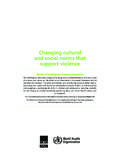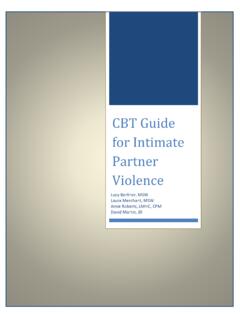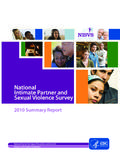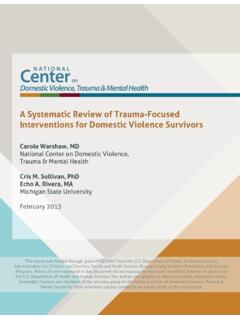Transcription of Assistance Program (IPVAP) Intimate Partner Violence ...
1 Intimate Partner Violence Assistance Program (IPVAP) 1 of 8 Intimate Partner Violence Safety Planning Guide What Is Safety Planning For IPV? Intimate Partner Violence (IPV) is a specific form of domestic Violence that occurs between two adults and includes verbal, emotional, psychological or sexual harm (including stalking behavior) by a current or former Partner . IPV behavior ranges from infrequent, verbal abuse to patterns of frequent, serious battering, sexual assault or life-threatening abuse (CDC, 2016). If you feel that you, or a loved one, may be in a potentially violent relationship, it is important to plan for the safety of the person as well as children, pets and property. A safety plan is a personalized, practical plan that includes ways to enhance safety while in a relationship, planning to leave, or after you leave. This safety planning guide will help you think about things you can do to stay safe. For more information or Assistance with safety planning, please contact your local VA Intimate Partner Violence Assistance Program Coordinator, social worker or provider or call/visit the National Domestic Violence Hotline at 1-800-799-SAFE (7233), Topics In This Worksheet Include (Just Click To Go To The Section): Basic Safety Planning Tips Staying in the Relationship Safety at Home During a Violent Incident Emotional Safety Technological Safety Financial Safety Safety for Children Leaving the Relationship Keeping my Address Safe Safety at my Workplace Safety with a Protective Order Important Numbers Safety Wallet Card Additional Resources Note: The VA Intimate Partner Violence Assistance Program (IPVAP) provides education, resources, and intervention for Veterans and their partners who experience or use Intimate Partner Violence through the coordination of programs and services and individual and group therapy.
2 The IPVAP promotes healthy relationships through couples counseling and workshops. Intimate Partner Violence Assistance Program (IPVAP) 2 of 8 Basic Safety Planning Tips: If in danger or feeling threatened, call 911 and/or remove yourself from the situation (if safe to do so). Keep a go-bag packed and accessible in case you need to leave unexpectedly. Keep this bag in a safe place that you can access easily such as my car, at work, or with a close friend. Some items to include in your go-bag include: Extra set of keys to car, house, safety deposit boxes, etc. Extra clothing. Cash, money cards, checkbook. Identification and documentation such as social security card, birth certificates, passport, marriage license, military paperwork such as ID and DD-214 s, insurance card. Important phone numbers and contact information, list of shelters, bank information, log in information for accounts, etc. Medication if applicable. Pre-paid cell phone.
3 O If you have children, be sure to include their birth certificates, important numbers of school, doctors or others who may need to be contacted. Other things you can do to enhance safety: Always keep purse/wallet and keys near at all times. Use your alarm on your keys to draw attention to your home in case of emergency. Maintain gas in the car. Practice where and how I will leave the house in an emergency. Teach children how to contact 911 and what to do in an emergency. Teach children and family or friends a code words that signals them to call 911. What If You Plan To Stay In The Relationship? There are many things you can do to maintain your safety if you plan to stay in the relationship. If the IPV events are mild, infrequent, or there are stressors in the relationship, consider seeking Assistance for yourself as well as your Partner to reduce IPV and develop skills that lead to a healthier relationship. The VA has programs that can help individuals and couples improve their relationship skills.
4 Contact your local IPVAP Coordinator, social worker or provider to discuss your options. Safety At Home: Keep in mind that mild or infrequent IPV can escalate in frequency and severity. Always be aware of your surroundings. Be aware of triggers and red flags that indicate a violent incident may occur. Keep a journal of things that happen at home and keep it in a safe place. Intimate Partner Violence Assistance Program (IPVAP) 3 of 8 In the event of Violence , avoid rooms with no outside doors and those where weapons are located. Tell a trusted neighbor about the Violence and ask them to call the police if they hear suspicious noises coming from my house/apartment. During A Violent Incident: Consider placating your Partner by giving them what they want until you can get out safely. If you can to safety leave the situation, plan where you will go and who you can call for Assistance . If you have children, know what shelters or safe places you can go to in an emergency.
5 Trust your instincts and judgment to determine what steps to take. Emotional Safety: If your Partner says something negative about you, plan what you will think about instead. Focus on ways to think positively about yourself and be assertive about your needs. Seek out support groups in your area to gain support from others and to learn more about myself and the relationship. Connect with your counselor to get individual support. Identify supportive people friends and family who can offer a safe place to thi nk through options Plan ways to calm yourself when you are feeling anxious or overwhelmed. Remind yourself daily of all of your best qualities. Write or journal about your feelings, especially when you feel vulnerable, sad or frustrated. Be aware if you are using coping strategies that are unhealthy (drugs, alcohol, shopping). Create a peaceful space ( , a room in the house or a space outdoors). Identify and work towards achievable goals ( , calling a local resource to see what services are available).
6 Small steps may create more options later. Technology Safety: If your Partner has access to your computer or cell phone - use a different one or change your settings. Be aware that technology can be used to track your location through GPS and spyware. Limit use of cordless phones and baby monitors. Create a new email or online accounts or change the passwords for existing accounts. Limit use of social networking sites and check my profile for the latest privacy settings. Intimate Partner Violence Assistance Program (IPVAP) 4 of 8 Keep a record or harassing or abusive messages, posts, or comments, and consider reporting them to the site s administrators. These records can be useful in obtaining a Protection Order. Find out where your address may be listed online (businesses, doctors, courts and government agencies may have online databases or publish records online) and ask they be removed. Clear the history of websites I ve visited on my computer and get rid of any spyware.
7 Financial Safety: Open your own bank accounts and try to store money there in case of an emergency. Change your passwords/PIN numbers and do not give out these numbers to anyone. Ask your bank to assign a password to the account so no withdrawals can be made without a password. If you feel you are unable to make financial decisions for yourself, consider naming a power of attorney. To prevent identity theft, keep your Social Security Number, address and credit/banking information as secret as possible by keeping cards locked away, not sharing numbers with anyone, and shredding any paper correspondence with these institutions. If you suspect you may be a victim of identity theft, monitor your bank and credit card statements and regularly check my credit reports through the credit bureaus. You can also put a fraud alert on your credit. If you discover you are a victim of identity theft, dispute any unauthorized transactions immediately. Safety Plan For Children: Assure children that the Violence is not OK, and it is not their fault.
8 Discuss a safety plan with your children and practice it with them. Talk to your children about what to do during a violent event or if they think Violence is about to occur ( , hiding in a bedroom, leaving the house, calling for help, faking an injury, etc.). Make sure children know multiple escape routes from our home. (Especially with young children, this can be discussed in the context of fire safety). Talk to children about not intervening to protect you and how to keep themselves safe. Tell children that it is okay to put their own safety first. Teach children what to say to themselves or each other to help stay calm during an IPV event. Speak to your children about the effects witnessing Violence may have on them and encourage them to share their feelings about it. Seek counseling services for your children. Make sure my children know how to reach your when away from you. Intimate Partner Violence Assistance Program (IPVAP) 5 of 8 If children are old enough and it is safe, you can use a code word with children, friends and family so they can call for help.
9 Inform your children s school, day care, etc. about who has permission to pick up your children. If you have a Protection Order or any custody orders have been issued, provide those to your child s school or daycare. What If You Are Planning To Leave The Relationship? Be aware that leaving an abusive relationship may be a time of increased risk. Be sure to reach out to others for Assistance . Using these tips, make a written, clear plan with specific information, contact numbers and resources. Plan ahead, if possible, to be prepared to leave an abusive Partner . Frequently review your safety plan and make adjustments as necessary. Other ways to stay safe if you are leaving your abusive Partner include changing the locks, adding deadbolt locks, adding motion-detector lights outside, and/or installing a security system. You can also change my typical patterns and be aware of my surroundings. When you have decided to leave, consider seeking a protection order (if appropriate) as soon as possible.
10 Do not answer calls from unknown numbers. Close all bank accounts, credit cards and debit cards and open new ones, especially if these are joint accounts with your Partner or if he/she has access to them. Contact your local VA Intimate Partner Violence Assistance Program Coordinator, community domestic Violence Program or National Domestic Violence Hotline for Assistance developing a personalized safe plan. Confide in a close friend that you are planning to leave and ask for their support. Contact your child s school to get any files if the children will be changing schools. Talk to your employer about leaving the job or allowing for adjustment time. Create a plan to ensure your pet(s) can be safe, if they can go with you or be left with trusted friend or family member. Some shelters do allow pets. Contact an attorney at to ask about finances, Family Court, custody and other civil proceedings. Keeping My Address Safe: File paperwork with the courts about address confidentiality.







